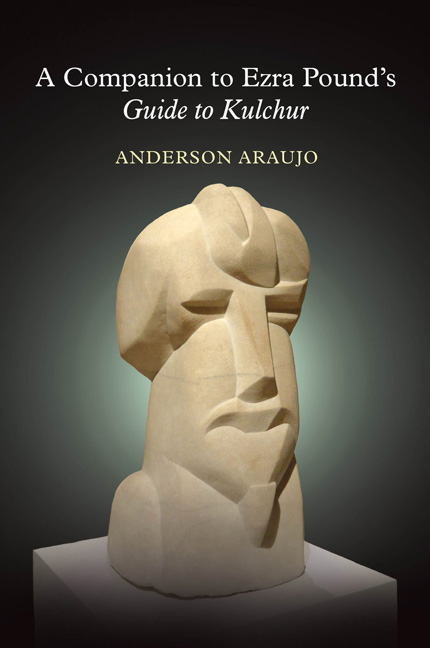Book contents
- Frontmatter
- Contents
- Acknowledgments
- Abbreviations
- Introduction
- Guide to Kulchur
- Part I
- Section I
- Section II
- Part II
- Section III
- Section IV
- Part III
- Section V
- Section VI
- Part IV
- Section VII
- Section VIII
- Section IV
- Part V
- Section X
- Section XI
- Part VI
- Section XII
- Section XIII
- 57 Epilogue
- 58 To Recapitulate
- Addenda: 1952
- Notes
- Index
58 - To Recapitulate
from Section XIII
- Frontmatter
- Contents
- Acknowledgments
- Abbreviations
- Introduction
- Guide to Kulchur
- Part I
- Section I
- Section II
- Part II
- Section III
- Section IV
- Part III
- Section V
- Section VI
- Part IV
- Section VII
- Section VIII
- Section IV
- Part V
- Section X
- Section XI
- Part VI
- Section XII
- Section XIII
- 57 Epilogue
- 58 To Recapitulate
- Addenda: 1952
- Notes
- Index
Summary
Ta Hio: Confucius's The Great Learning or The Great Digest (cf. notes GK 15–16).
詩: Shī, the Confucian Odes or Book of Odes (cf. note GK 121).
Plato … life force: Cf. Pound's affirmation in “The Serious Artist” (1913), “You feel bucked up when you come on a swift moving thought in Plato.”
Michelet: Jules Michelet (1798–1874), French historian and author of Histoire de la Revolution francaise (1847–53) and the monumental Histoire de France (1833–69). In keeping with Pound's view that “Michelet saw France as something in process,” Roland Barthes argues that “Micheletist history proceeds by waves: the narrative is always conducted toward a display, an epiphany, and the tableau is never closed, its goal is an anxiety … no chapter of Michelet is ever really conclusive, but no line of facts is ever without its tropism.” In “The Jefferson-Adams Letters” (1937–38), Pound groups Michelet with other eminent French writers as individuals who “wanted to set down an intelligible record of life in which things happened.”
one of the Nicomachean dissociations (V. iii. 7, page 322): In V.iii.7, Aristotle further outlines his thoughts on distributive justice,
This [i.e., principle of equality and justice in distributions] is also clear from the principle of “assignment by desert.” All are agreed that justice in distributions must be based on desert of some sort, although they do not all mean the same sort of desert; democrats make the criterion free birth; those of oligarchical sympathies wealth, or in other cases birth; upholders of aristocracy make it virtue.
In his copy of the Nicomachean Ethics, Pound underlined “democrats make the criterion free birth.”
ideas that are going into action: Cf. note GK 34.
- Type
- Chapter
- Information
- A Companion to Ezra Pound's Guide to KulcherGuide to Kulcher, pp. 359 - 360Publisher: Liverpool University PressPrint publication year: 2018



